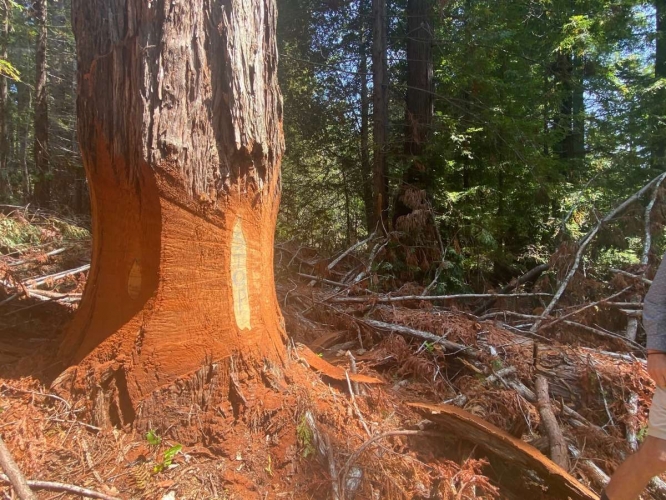
Activists have left a message to loggers on an inner layer of this girdled redwood. Ashley Harrell
How a California State Forest Became a Battleground for Logging Redwoods on Public Land
Oct 14, 2021 at 9:00am
A century-old redwood — California’s most revered tree — lies dead on the forest floor.
Its trunk has been sawed into two large sections, a message scrawled on its stump in red marker: “STOP.” Beneath, the stump’s diameter is recorded: 55 inches, about the height of a 10-year-old child. Lower still, in smaller letters, another message: “This is not fire prevention.”
Surrounding this tree are other redwoods that have been felled or girdled, meaning large swaths of their bark have been carved away from their trunks. More redwoods are marked blue — they too are slated for a timber harvest. Dead foliage and piles of branches abound.
The wounded and dead trees look like casualties left behind on a battlefield. And in a way, that’s what they are.
Welcome to Jackson Demonstration State Forest, a 48,652-acre forest managed by the California Department of Forestry and Fire Protection (Cal Fire). Although it’s little-known outside the coastal Northern California county of Mendocino, Jackson has become ground zero in an escalating war over the management of redwoods on public land, with catastrophic wildfires and global climate change necessitating urgency and raising the stakes.
Back in April, activists began protesting the timber harvest plan at the Caspar 500 site within Jackson. They’ve been doing tree-sits and blocking the logging operations throughout the forest since.
But forestry academics and professionals are largely in favor of redwood timber harvests. For decades, the harvests have paid for the upkeep of a public forest with three stated objectives: demonstrating best practices to private timberland owners, hosting research and providing recreational opportunities. The research going on in Jackson, which regularly involves cutting large redwoods, has become more important than ever, they say.
Continue reading the article from SF Gate here.
